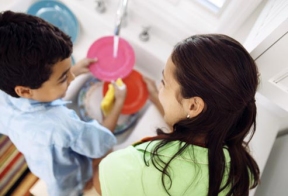
Doing dishes the old-fashioned way instead of using a dishwasher may help reduce children’s risk for developing allergies later on, says a new study published in the journal Pediatrics and reported on by LiveScience.
For the study, scientists at the University of Gothenburg in Sweden reviewed survey data from more than 1,000 children and their parents. Questionnaires explored families’ allergy histories, their typical dishwashing practices (hand-washing versus using a dishwasher) and eating habits during a 12-month period.
Researchers found that children in families who hand-washed their dishes were ultimately about 40 percent less likely to develop allergies than kids whose families used a dishwasher to clean their crockery.
These findings offer further support the popular “hygiene hypothesis” theory. This theory suggests that exposure to bacteria early in life can help stimulate children’s immune systems to ward off potential allergies later on. But don’t throw out that dishwasher just yet. Most scientists said the study’s results are too preliminary to put them into practical use right now.
One comment on the research cautioned that, according to the “hygiene hypothesis,” exposure to bacteria has the greatest effect on allergy development before a child reaches 6 months of age. Since a six-month-old would more than likely still be breast-feeding at that age, the child would have limited exposure to a family’s dishes, hand-washed or otherwise. The CDC estimates that, today, about one in 20 American children have food allergies. That’s a 50 percent jump in allergy rates from the 1990s.









